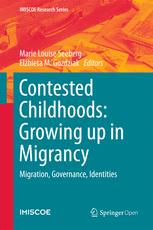

Most ebook files are in PDF format, so you can easily read them using various software such as Foxit Reader or directly on the Google Chrome browser.
Some ebook files are released by publishers in other formats such as .awz, .mobi, .epub, .fb2, etc. You may need to install specific software to read these formats on mobile/PC, such as Calibre.
Please read the tutorial at this link: https://ebookbell.com/faq
We offer FREE conversion to the popular formats you request; however, this may take some time. Therefore, right after payment, please email us, and we will try to provide the service as quickly as possible.
For some exceptional file formats or broken links (if any), please refrain from opening any disputes. Instead, email us first, and we will try to assist within a maximum of 6 hours.
EbookBell Team

4.1
100 reviewsThis book is open access under a CC BY-NC 2.5 license.
This book explores specific migration, governance, and identity processes currently involving children and ideas of childhood. Migrancy as a social space allows majority populations to question the capabilities of migrants, and is a space in which an increasing number of children are growing up. In this space, families, nation-states, civil society, as well as children themselves are central actors engaged in contesting the meaning of childhood. Childhood is a field of conceptual, moral and political contestation, where the ‘battles’ may range from minor tensions and everyday negotiations of symbolic or practical importance involving a limited number of people, to open conflicts involving violence and law enforcement. The chapters demonstrate the importance of how we understand phenomena involving children: when children are trafficked, seeking refuge, taken into custody, active in gangs or in youth organisations, and struggling with identity work. This book examines countries representing very different engagements and policies regarding migrancy and children. As a result, readers are presented with a comprehensive volume ideal for both the classroom and for policy-makers and practitioners. The chapters are written by experts in social anthropology, human geography, political science, sociology, and psychology.